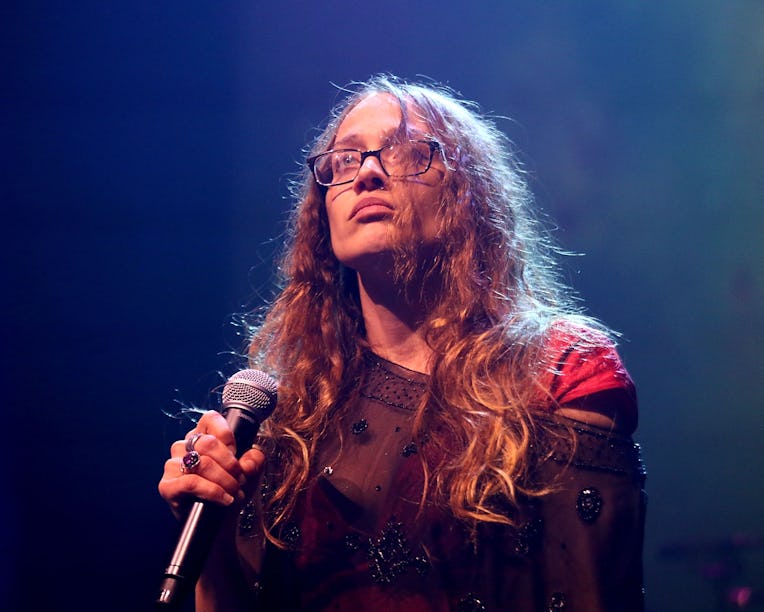In a recent viral video, Fiona Apple can be seen fixated on a peculiar spectacle. “Have you seen how slugs have sex?” the singer asks, speaking directly into her camera. For a little over two minutes, she points her camera to a video titled “Who Knew Slugs Could Be So Romantic?” showing footage of two slugs in the midst of intercourse. “That’s their penises, that intertwine together to make a flower,” an awestruck Apple says.
The clip was uploaded to “Fiona Apple Rocks,” a fan-run Youtube account that regularly posts short, twee personal videos of Apple. Up until a few years ago, the account mostly uploaded old live performances and interviews of Apple. In April of 2018 however, Apple would make her first appearance on the channel, answering fans’ questions. “New music?” (yes) “Any songs that you cannot perform live for any reason?” (“Never is a Promise,” “Jonathan,” and “Hot Knife”) “Do you ever have lucid dreams?” (Yes) “Any you want to share?” (No.)
Coming across these videos for the first time a few years ago was a delightful, albeit surprising turn for fans of the fiercely reclusive singer who was breaking one of her famously years-long streaks of not speaking to the public. “Fiona just wanted to put stuff out on the internet,” Simon, the fan who runs the Fiona Apple Rocks Tumblr account told me. “[She wanted] to maintain a connection with her fans without having her own personal social media presence.”
It’s no secret that Apple has had a contentious relationship with the spotlight. Since the moment that she slinked around in a dimly lit basement littered with the bodies of passed-out partygoers in her music video for “Criminal,” there’s always been a lore around Apple that has cast her as a poster child for the disaffected youth of the ’90s. Following in the footsteps of other artists of the time like Alanis Morisette— who just a year before Apple’s debut burst on to the scene belting a song about giving not Uncle Joey from Full House fellatio in the movie theaters — and Hole’s front lady Courtney Love, who is Courtney Love, the latter half of the ’90s were an auspicious time for angry white girls in music.
In Tidal, Apple’s rage took on several different forms. She is scathing in the opening track “Sleep to Dream;” Her voice matching the furor of the beating drums, as she sings to deceitful lover. (“You said love is a hell you cannot bear/and I said ‘give me mine back and then go there for all I care.’”) She is at once defensive and on guard in “Shadow Boxer,” while being worrisomely disarmed in “Never is a Promise” and “Pale September.” In interviews after the album was released, Apple spoke about being raped at 12 years old by a stranger, which provided the tragic backdrop for “Sullen Girl” and “The Child is Gone,” in which she sings mournfully about the innocence she lost after the fact.
Tidal was a debut of a young girl wrestling with the ever brutal waves of life. But young women are rarely given the grace of wholeness. Her image became permanently fixed as the wide-eyed seductress who sang “I’ve been a bad bad girl.” Male journalists heard this lyric and decided Apple was someone at whom we could leer, that her rage could be sexy rather than unsettling. “THE POUTY BEE-STUNG LIPS. The taut, pierced belly exposed by a flouncy shirt. The cascading honey-brown hair. And those eyes. Is this the next waif supermodel?” opens a 1997 New York Times profile of Apple. “At the meet and greet, she's still in her stage clothes, which are both sexy and girlish,” a quote from the 1997 SPIN profile of Apple. “(Assuming there's a difference between sexy and girlish, which is something Apple forces you to consider.)”
When she took to the stage at the 1997 MTV Awards to accept her award and famously said “this world is bullshit,” many of the same fans who fetishized her now found her insufficiently grateful for the attention. “I went from being ‘tragic waif ethereal victim’ to being ‘brat bitch loose cannon’” Apple said in a 1998 Rolling Stone profile about the aftermath of that speech.
The years that followed her initial success were marred by professional and personal anguish, including a delay in her third studio album — which many fans assumed was a label decision, only for Apple to come out to say she was behind the pushed back release. Her one-time romance with filmmaker Paul Thomas Anderson, which has garnered a cult following over the years, was volatile, as Apple has been recently open about. There was also her 2012 arrest for possession and her brief relationship with comedian Louis CK. It’s no wonder she’s decided to settle into a quiet life with her dog, her lesbian filmmaker roommate Zelda, and the beaches of California.
But since the release of Fetch the Bolt Cutters in 2020, Apple has taken these tentative, charming steps back into the spotlight — on her own terms this time. Along with the weekly videos of hers that are uploaded, there’s her organizing towards court transparency and for indigenous rights. Her old hits are still iconic, like when a scantily clad Jennifer Lopez shakes her ass to “Criminal” in Hustlers, or the “Criminal” tribute act popularly known as Euphoria.
Nearly 25 years since Tidal was released and the media storm that followed, Apple still captures a generation of young women who feel just as uneasy in the world as she did. She has always spoken to them through her music, and now she can speak to them directly. Even if it’s just to bask in the beautiful way that slugs have sex.
Hanna Phifer is a writer and cultural critic based in Charlotte, North Carolina.
